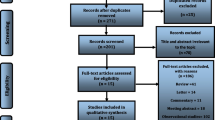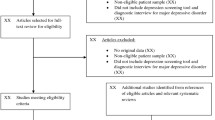Abstract
The Mood Disorders Questionnaire (MDQ) is a tool that was created for screening for bipolar disorders. This study investigates the utility of the MDQ in an acute psychiatric in-patient setting. All patients admitted to an acute inpatient psychiatric unit completed the MDQ. Discharge diagnoses strictly followed DSM-IV criteria, but were determined through clinical interviews, collateral information, and psychiatric history, and were used to calculate the sensitivity and specificity of the MDQ in this setting. 44 subjects were admitted during the study period; 42 completed the MDQ. 12 had bipolar illness. Sensitivity of MDQ was 0.58, and specificity was 0.76 (P < 0.05). Positive predictive value was 0.50 and negative predictive value was 0.82. The specificity and sensitivity of the MDQ appears to vary with the illness severity of the patients screened.
Similar content being viewed by others
Abbreviations
- IRB:
-
Institutional review board/Human Studies Subject Protection Committee
- MDQ:
-
Mood Disorders Questionnaire
- N:
-
Number
- NPV:
-
Negative predictive value
- PPV:
-
Positive predictive value
- P :
-
Probablity
- SCID:
-
Structured clinical interview diagnosis
References
Lish JD, Dime-Meenan S, Whybrow PC, Price RA, Hirschfeld RM. The National Depressive and Manic Depressive Association (DMDA) survey of bipolar members. Journal of Affective Disorders 31:281–294, 1994
Ghaemi SN, Boiman EE, Goodwin FK. Diagnosing bipolar disorder and the effect of antidepressants: A naturalistic study. Journal of Clinical Psychiatry 61:804–808, 2000
Hirschfeld RM, Lewis L, Vornik LA. Perceptions and impact of bipolar disorder: how far have we really come? Results of the national depressive and manic-depressive association 2000 survey of individuals with bipolar disorder. Journal of Clinical Psychiatry 64(2):161–174, 2003
Hirschfeld RM, Williams JB, Spitzer RL, Calabrese JR, Flynn L, Keck PE Jr, Lewis L, McElroy SL, Post RM, Rapport DJ, Russell JM, Sachs GS, Zajecka J. Development and validation of a screening instrument for bipolar spectrum disorder: the Mood Disorder Questionnaire. American Journal of Psychiatry 157(11):1873–1875, 2000
Hirschfeld RM, Holzer C, Calabrese JR, Weissman, M, Reed M, Davies, M, Frye MA, Keck P, McElroy S, Lewis L, Tierce J, Wagner KD, Hazard E. Validity of the mood disorder questionnaire: a general population study. American Journal of Psychiatry 160(1):178–180, 2003
Calabrese JR, Hirschfeld RM, Frye MA, Reed ML. Impact of depressive symptoms compared with manic symptoms in bipolar disorder: results of a U.S. community-based sample. Journal of Clinical Psychiatry 65(11):1499–1504, 2004
Calabrese JR, Hirschfeld RM, Reed M, Davies MA, Frye MA, Keck PE, Lewis L, McElroy SL, McNulty JP, Wagner KD. Impact of bipolar disorder on a U.S. community sample. Journal of Clinical Psychiatry 64(4):425–432
Frye MA, Calabrese JR, Reed ML, Wagner KD, Lewis L, McNulty J, Hirschfeld RM. Use of health care services among persons who screen positive for bipolar disorder. Psychiatric Services 56(12):1529–1533, 2005
Phelps JR, Ghaemi SN. Improving the diagnosis of bipolar disorder: Predictive value of screening tests. Journal of Affective Disorders 92:141–148, 2006
Dunner DL, Tay LK. Diagnostic reliability of the history of hypomania in bipolar II patients and patients with major depression. Comprehensive Psychiatry 34(5):303–307, 1993
Mantere O, Suominen K, Arvilommi P, Valtonen H, Leppämäki S, Isometsä E. Clinical predictors of unrecognized bipolar I and II disorders. Bipolar Disorder 10(2):238–244, 2008
Acknowledgments
This study was funded by the authors’ own professional resources.
Conflicts of interest
None of the authors have any pertinent conflicts of interest to declare. Dr. El-Mallakh is a speaker for AstraZeneca, Bristol Myers Squibb, Merck, and Novartis.
Author information
Authors and Affiliations
Corresponding author
Rights and permissions
About this article
Cite this article
Suresh, K.S., Jeannie Roberts, R. & El-Mallakh, R.S. The Sensitivity and Specificity of the Mood Disorders Questionnaire Varies with the Intensity of Mood Illness. Psychiatr Q 84, 337–341 (2013). https://doi.org/10.1007/s11126-012-9249-8
Published:
Issue Date:
DOI: https://doi.org/10.1007/s11126-012-9249-8




